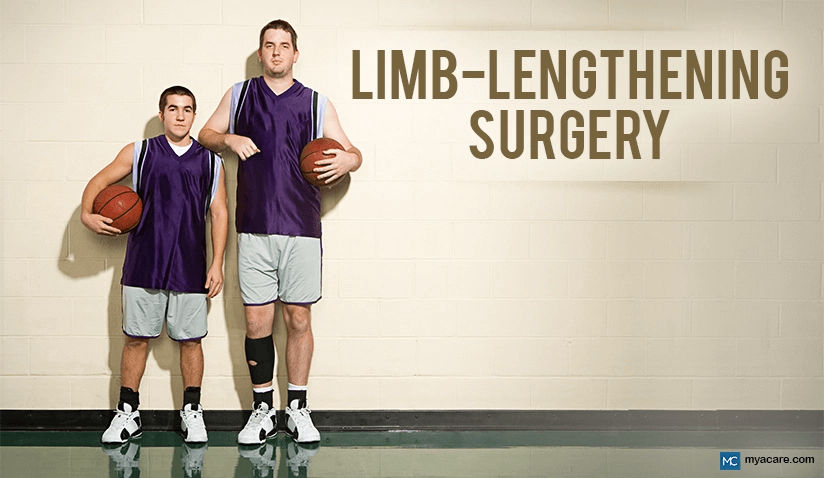Limb-Lengthening Surgery: Pros and Cons

Limb-lengthening surgery is a medical procedure performed with the intent to increase the length of an individual's limbs (arms or legs). While it can be a life-changing procedure for some people, it is a complex and invasive surgery that carries some risks and potential complications. Therefore, it is vital to carefully weigh the benefits and risks of this procedure before deciding whether to undergo it.
In this article, we will provide an overview of the pros and cons of limb-lengthening surgery to help individuals make an informed decision about whether this procedure is right for them. We will discuss the potential benefits of the surgery, such as increased height and improved mobility, as well as the possible risks, such as infection and nerve damage.
What is Limb-Lengthening Surgery?
Limb-lengthening surgery is a medical procedure that aims to increase the length of an individual's limbs, either the arms or legs. The surgery is typically performed on people who have congenital conditions that result in short stature or those who have had limb-length discrepancies due to injury or disease.
During the surgery, the bone is cut and separated, and then a device, such as an internal or external fixator, is attached to the bone to gradually stretch it for several months. The device is adjusted periodically to ensure that the bone is lengthening at a safe and controlled rate.
As the bone gradually stretches, new bone tissue fills in the gap, resulting in a longer bone. After the desired length is achieved, the device is removed, and the bone is allowed to heal. Patients typically require physical therapy after the surgery to aid in regaining strength and restoring the range of motion in the affected limb.
Limb-lengthening surgery is a complex procedure that carries some risks and requires a significant commitment from the patient in terms of time and effort. However, for some people, it can be a life-changing procedure that improves their quality of life and allows them to participate in activities that were previously out of reach.
Who is a Good Candidate?
Limb-lengthening surgery is typically recommended for individuals who have a limb-length discrepancy of at least two inches (5 centimeters) or more. This can be caused by many factors, including congenital conditions, such as achondroplasia or dwarfism, or acquired conditions, such as bone fractures or infections.
In general, a good candidate for limb-lengthening surgery is someone who:
- Has a limb-length discrepancy of five centimeters or more
- Has completed skeletal growth (usually around the age of 16 for girls and 18 for boys)
- Is in good overall health
- Has realistic expectations for the outcome of the surgery
- Is willing to commit to a lengthy and rigorous rehabilitation process
Nevertheless, limb-lengthening surgery should only be considered after a thorough evaluation by a qualified medical professional, who can assess the individual's specific situation and determine whether the potential benefits outweigh the risks.
Pros
Limb-lengthening surgery can offer several potential benefits to individuals who have a limb-length discrepancy or other conditions that affect their height or mobility. Here are some of the main pros of limb-lengthening surgery:
- Increased height
One of the primary benefits of limb-lengthening surgery is the ability to increase an individual's height. This can be especially beneficial for individuals who have a height-related medical condition, such as dwarfism, or for those who feel self-conscious about their height.
- Improved mobility
For individuals with a limb-length discrepancy, limb-lengthening surgery can help improve mobility and reduce the risk of developing joint problems or other complications related to uneven gait or posture.
- Better quality of life
By increasing height and improving mobility, limb-lengthening surgery can also improve an individual's overall quality of life. This can include increased confidence, improved social interactions, and the capability to participate in activities that were previously difficult or impossible.
- Better than non-invasive options
In some cases, non-invasive options, such as shoe lifts or orthotics, may not be sufficient to correct a limb-length discrepancy. In these cases, limb-lengthening surgery can offer a more permanent and effective solution.
- Customizable
Limb-lengthening surgery is a customizable procedure that can be tailored to meet the specific needs and goals of each individual. This means that the lengthening can be done gradually and in a controlled manner, which reduces the risk of complications and allows for better results.
Cons
While there are potential benefits to limb-lengthening surgery, there are also several potential risks and complications associated with the procedure. Here are some of the main cons of limb-lengthening surgery:
During the lengthening process, patients may experience pain, discomfort, and muscle stiffness, which can be difficult to manage. Pain medication and physical therapy can help alleviate these symptoms, but it may take several months for the pain to subside completely.
- Risk of infection
Because the surgery involves breaking the bone and inserting pins or screws into the limb, there is a risk of infection. Patients must be careful to keep the pins and wounds clean to prevent infection, which can be a serious complication that requires further medical treatment.
- Nerve damage
During the surgery, there is a risk of nerve damage, which can potentially cause numbness, tingling, or weakness in the affected limb. In some cases, nerve damage may be permanent.
- Lengthy rehabilitation process
After the surgery, patients must undergo a lengthy rehabilitation process, which can last several months. This process involves physical therapy, regular check-ups, and adjustments to the lengthening device, which can be time-consuming and require a significant commitment from the patient.
- High cost
Limb-lengthening surgery is a complex and specialized procedure that can be expensive, especially if it is not covered by insurance. Patients should carefully consider the financial implications of the surgery and whether they can afford the costs.
- Potential complications
In rare cases, limb-lengthening surgery can lead to serious complications, such as bone fractures, blood clots, or issues with the lengthening device. These complications may require further surgery or medical treatment, and in some cases, they can be life-threatening.
The Bottom Line
Limb-lengthening surgery can be a life-changing procedure for some individuals, but it is important to carefully weigh the pros and cons before deciding whether to undergo the surgery. Patients should consult with a qualified medical professional to discuss their options and the potential risks and benefits of the procedure.
To search for the best Plastic & Cosmetic Surgery healthcare providers in Croatia, Germany, Greece, India, Malaysia, Singapore, Slovakia, Spain, Thailand, Turkey, the UAE, the UK and the USA, please use the Mya Care search engine.
To search for the best doctors and healthcare providers for Limb Lengthening worldwide, please use the Mya Care search engine.

Dr. Rosmy Barrios is an aesthetic medicine specialist with international work experience. She earned her physician diploma at the Universidad Del Norte’s School of Medicine in Barranquilla, Colombia, and her specialty at John F. Kennedy University in Buenos Aires, Argentina. Dr. Barrios is a member of the Pan-American Aesthetic Medicine Association (PASAM) and the Union Internationale de Médecine Esthétique (UIME). She is an expert health writer with keen interests in aesthetic medicine, regenerative aesthetics, anti-aging, fitness, and nutrition. Currently, Dr. Barrios heads the Regenerative Aesthetics department at a renowned Internal Medicine clinic based in Belgrade, Serbia.
References:
Featured Blogs



